Difference between revisions of "Last Will and Testament"
(→Page 6) |
m |
||
| (34 intermediate revisions by 4 users not shown) | |||
| Line 1: | Line 1: | ||
{{DISPLAYTITLE:Last Will and Testament, with Codicil}} | {{DISPLAYTITLE:Last Will and Testament, with Codicil}} | ||
| − | + | [[File:WytheWillp5.jpg|right|thumb|400px|<p>"George Wythe, June 11, 1806, Last Will and Testament with Codicil, p. 5." Image from the [https://www.loc.gov/resource/mtj1.036_0314_0319/ Library of Congress,] ''The Thomas Jefferson Papers.''</p>]] | |
| + | [[File:WytheWillp6.jpg|right|thumb|400px|<p>"George Wythe, June 11, 1806, Last Will and Testament with Codicil, p. 6." Image from the [https://www.loc.gov/resource/mtj1.036_0314_0319/ Library of Congress,] ''The Thomas Jefferson Papers.''</p>]] | ||
| + | [[Death of George Wythe|George Wythe died]] on June 8, 1806 as the result of a suspected poisoning. His last will and testament was read at a General Court in Richmond on June 11, witnessed by [[Edmund Randolph]], William Price, Samuel Greenhow, and Samuel McCraw. | ||
| − | + | Wythe's will went through several changes before his death. The first version was written by Wythe in April, 1803, appointing [[William DuVal]] as his executor, granting the bulk of his estate to his grandnephew, [[George Wythe Sweeney]], and making arrangements for the continued support of his household servants, Benjamin, [[Lydia Broadnax]], and [[Michael Brown]]. A codicil to this will, added in January, 1806, gave his books and scientific instruments to [[Thomas Jefferson]], and charged him with using the estate for the support of Brown. Wythe's servant Ben had died in the interim. | |
| − | + | A copy of the will appears to have been made in 1806, which is not in Wythe's handwriting, but signed by William Allen, Clerk of the General Court. A second codicil was added to this will in February, 1806, making small changes and fatefully giving Brown's share of the estate to Sweeney in the event Michael dies "before his full age." | |
| − | |||
| − | + | A third and finally codicil was hastily added on June 1, 1806 while Wythe lay on his deathbed, revoking Sweeney's share and dividing it among the other grandchildren of Wythe's sister. | |
| − | |||
| − | |||
| − | + | The six-page manuscript of George Wythe's last will and testament is preserved in [https://www.loc.gov/resource/mtj1.036_0314_0319/?sp=2 The Papers of Thomas Jefferson], at the Library of Congress, Washington, D.C.<ref>[https://www.loc.gov/search/?fa=partof:the+thomas+jefferson+papers+at+the+library+of+congress:+series+1:+general+correspondence.+1651-1827 The Thomas Jefferson Papers at the Library of Congress:] Series 1: General Correspondence. 1651 to 1827, Library of Congress, Washington, D.C.</ref> The pagination of the collection is slightly out of order, with Wythe's original will of 1803 making up pages five and six, and the later 1806 copy comprising pages one through four. It has been chronologically ordered, here: | |
| − | [ | ||
| − | those to which the former was devoted. To the said Thomas | + | ==Document text, 20 April 1803 & codicil, 19 January 1806 (Wythe's copy)== |
| − | Good Lord most mercifull, let penitence<br /> | + | ===[Page 1]=== |
| − | Sincere to me restore lost innocence; <br /> | + | <blockquote> |
| − | In wrath my grievous sins remember not; <br /> | + | Contemplating that event, which one in the second year of his sixteenth lustrum may suppose to be fast approaching, at this time, the twentieth day of April in the third year of the nineteenth centurie since the christian epoch, when such is my health of bodie that vivere amem, and yet, such my disposition of mind that, convinced of this truth, what supreme wisdom destinateth is best, obeam libens,<ref>Both Latin phrases - vivere amem (“I would like to live”) and obeam libens (“willing to die”) come from a poem by the first century BCE Roman poet Horace (Odes 3.9.24). The line comes from a humorous ode in which a woman, Lydia, states that she would like to live but is willing to die with her lover. Thus, Wythe takes a humorous, romantic turn of phrase from a Horatian Ode about love and applies it to his own mortality as he contemplates death, perhaps aiming to inject a bit levity into such a serious document.</ref> i, George Wythe of the citie of Richmond, declare what is herein after written to be my testament, probably the last: Appointing my friendlie neighbour William Duval executor, and desiring him to accept fifty pounds for his trouble in performing that office over a commission upon his disbursements and receipts inclusive, i devise to him the houses and ground in Richmond which i bought of William Nelson, and my stock in the funds, in trust, with the rents of one and interest of the other to support my freed woman Lydia Brodnax, and freed man Benjamin, and freed boy Michael Brown, during the lives of the two former, and, after their deaths, in trust to the use of the said Michael Brown; and all the other estate to which i am and shall at the time of my death be intitled, i devise to George Wythe Sweney the grandson of my sister.<br /> |
| − | My secret faults out of thy record blot; <br /> | + | George Wythe [Seal] |
| − | That after | + | |
| − | Of pure beatitude i may partake<br /> | + | I, who have hereunder written my name, this nineteenth day of January, in the sixth year of the before mentioned centurie, revoke so much of the preceding devise to George Wythe Sweney as is inconsistent with what followeth. The residuarie estate devised to him is hereby charged with debts and demands. I give my books and small philosophical apparatus to Thomas Jefferson, president of the united states of America; a legacie, considered abstractlie perhaps not deserving a place in his musaeum, but, estimated by my good will to him, the most valuable to him of any thing which i have power to bestow. My stock in the funds before mentioned hath been changed into stock in the Bank of Virginia. I devise the latter to the same uses, except as to Ben, who is dead, as those to which the former was devoted. To the said Thomas Jefferson's patronage i recommend the freed boy <strike>Michael boy</strike> Michael Brown in my testament named, for whose maintenance, education or benefit as the said Thomas Jefferson shall direct, i will the said bank stock, or the value thereof it it be changed again, to be disponed. And now,<br /> |
| − | George Wythe [Seal] <br /> | + | GOOD LORD, most mercifull, let penitence<br /> |
| − | + | Sincere to me restore lost innocence;<br /> | |
| − | I will that Michael Brown have no more than one half my Bank Stock, and George Wythe Sweney, have the other immediatelie. | + | <hr width="350" /> |
| − | I give to my friend Thomas Jefferson my silver cups and gold headed cane, and to my friend William Duval my silver ladle and table and teaspoons. | + | ὃς<br /> |
| − | G. Wythe [Seal] <br /> | + | φιλος δ᾽ ην ανθρωποισι;<br /> |
| − | 24 of February 1806. <br /> | + | Παντας γαρ φιλεεσκεν.<ref>"Beloved for welcoming all guests." Homer, [http://www.perseus.tufts.edu/hopper/text?doc=Perseus%3Atext%3A1999.01.0133%3Abook%3D6%3Acard%3D1 ''Iliad'' 1.14-15.] Referring to Axylus, Teuthras' son, who was slain by Diomedes, and who was renowned for his hospitality.</ref> |
| + | </blockquote> | ||
| + | |||
| + | ===[Page 2]=== | ||
| + | <blockquote> | ||
| + | In wrath my grievous sins remember not; <br /> | ||
| + | My secret faults out of thy record blot; <br /> | ||
| + | That after deaths sleep, when i shall awake, <br /> | ||
| + | Of pure beatitude i may partake, <br /> | ||
| + | George Wythe [Seal] <br /> | ||
| + | <br /> | ||
| + | <br /> | ||
| + | <center> | ||
| + | Testament of G' Wythe, <br /> | ||
| + | to be published when he<br /> | ||
| + | shall cease to brethe, if not<br /> | ||
| + | by him required before. | ||
| + | </center> | ||
| + | <br /> | ||
| + | <br /> | ||
| + | </blockquote> | ||
| + | |||
| + | ==Document text, 1806 copy and codicils, 24 February & 1 June 1806== | ||
| + | ===[Page 3]=== | ||
| + | [[File:WytheWillp1.jpg|right|thumb|250px|<p>"George Wythe, June 11, 1806, Last Will and Testament with Codicil, p. 1." Image from the [https://www.loc.gov/resource/mtj1.036_0314_0319/ Library of Congress,] ''The Thomas Jefferson Papers.''</p>]] | ||
| + | <blockquote> | ||
| + | Contemplating that event, which one in the second year of this sixteenth lustrum may suppose to be fast approaching, at this time, the twentieth day of April in the third year of the nineteenth centurie since the Christian epoch, when such is my health of bodie that vivere amem, and yet such my disposition of mind that, convinced of this truth, what supreme wisdom destinateth is best, obeam libens, i, George Wythe of the citie of Richmond; declare what is herein after written to be my testament, probablie the last: Appointing my friendlie neighbor [[William DuVal|William Duval]] executor, and desiring him to accept fifty pounds for his trouble in performing that office over a commission upon his disbursements and receipts inclusive, i devise to him the houses and ground in Richmond, which i bought of William Nelson, and my stock in the funds, in trust; with the rents of one and interest of the other to support my freed woman [[Lydia Broadnax|Lydia Brodnax]], and my freed man Benjamin, and freed boy [[Michael Brown]], during the lives of the two former, and after their deaths, in trust to the use of the said Michael Brown; and all the other estate to which i am and shall at the time of my death be entitled, i devise to [[George Wythe Sweeney|George Wythe Sweney]] the grandson of my sister.<br /> | ||
| + | George Wythe [Seal] | ||
| + | |||
| + | I, who have hereunder written my name, this nineteenth day of January in the sixth year of the before mentioned centurie, revoke so much of the preceeding devise to George Wythe Sweney as is inconsistent with what followeth. The residuary estate devised to him is hereby charged with debts and demands. I give my books and small philosophical apparatus to [[Thomas Jefferson]] President of the United States of America: a legacie, considered abstractlie, perhaps not deserving a place in his museum, but, estimated by my good will to him, the most valuable to him of any thing which I have power to bestow. My stock in the funds before mentioned hath been changed into stock in the Bank of Virginia. I devise the latter to the same uses except as to Ben who is dead, as those | ||
| + | </blockquote> | ||
| + | |||
| + | ===[Page 4]=== | ||
| + | [[File:WytheWillp2.jpg|right|thumb|250px|<p>"George Wythe, June 11, 1806, Last Will and Testament with Codicil, p. 2." Image from the [https://www.loc.gov/resource/mtj1.036_0314_0319/ Library of Congress,] ''The Thomas Jefferson Papers.''</p>]] | ||
| + | <blockquote> | ||
| + | those to which the former was devoted. To the said Thomas Jefferson's patronage i recommend the freed boy Michael Brown in my testament named, for whose maintenance, education or other benefit, as the said Thomas Jefferson shall direct, i will the said bank stock or the value thereof, if it be changed again to be disposed. And now<br /> | ||
| + | Good Lord most mercifull, let penitence<br /> | ||
| + | Sincere to me restore lost innocence; <br /> | ||
| + | In wrath my grievous sins remember not; <br /> | ||
| + | My secret faults out of thy record blot; <br /> | ||
| + | That after deaths sleep, when i shall awake <br /> | ||
| + | Of pure beatitude i may partake<br /> | ||
| + | George Wythe [Seal]<br /> | ||
| + | ὃς<br /> | ||
| + | φιλος δ᾽ ην ανθρωποισι;<br /> | ||
| + | Παντας γαρ φιλεεσκεν. | ||
| + | |||
| + | I will that Michael Brown have no more than one half my Bank Stock, and George Wythe Sweney, have the other immediatelie.<br /> | ||
| + | I give to my friend Thomas Jefferson my silver cups and gold headed cane, and to my friend William Duval my silver ladle and table and teaspoons. If Michael die before his full age: i give what is devised to him to George Wythe Sweney. I give to Lydia Brodnax my fuel: This is to be part of my will and as it were written of the parchment inclosed with my name in two places.<br /> | ||
| + | G. Wythe [Seal]<br /> | ||
| + | 24 of February 1806.<br /> | ||
In the name of God Amen! <br /> | In the name of God Amen! <br /> | ||
| − | I George Wythe, of the city of Richmond, having heretofore | + | I George Wythe, of the city of Richmond, having heretofore made my last will on the 20th day of April, in the third year of the nineteenth centurie since the Christian Epoch, and a codicil thereto on the 19th day of January in the sixth year of the aforesaid centurie and another codicil |
| + | </blockquote> | ||
| − | ===Page | + | ===[Page 5]=== |
| − | [[File:WytheWillp3.jpg|right|thumb| | + | [[File:WytheWillp3.jpg|right|thumb|250px|<p>"George Wythe, June 11, 1806, Last Will and Testament with Codicil, p. 3." Image from the [https://www.loc.gov/resource/mtj1.036_0314_0319/ Library of Congress,] ''The Thomas Jefferson Papers.''</p>]] |
| + | <blockquote> | ||
| + | codicil on the 24th day of February 1806 – | ||
| − | + | do ordain and constitute the following to be a third codicil to my said will; hereby revoking the said will and codicils in all the devises and legacies in them or either of them contained, relating to, or in any manner concerning George Wythe Sweney, the grandson of my sister; but I confirm the said will and codicils in all other parts except as to the devise and bequest to Michael Brown, in the said will mentioned, who, I am told, died this morning, and therefore they are void. And I do hereby devise and bequeath all the estate which I have devised or bequeathed to the said George Wythe Sweney or for his use in the said will or codicils and all the interest and estate, which I have therein devised or bequeathed in trust for, or to the use of the said Michael Brown, to the brothers and sisters of the said George Wythe Sweney, the grand children of my said sister to be equally divided among them share and share alike. In testimony whereof I have hereunto subscribed my name and affixed my seal, this first day of June in the year of 1806.<br /> | |
| − | do ordain and constitute the following to be a third codicil to my said will; hereby revoking the said will and codicils in all the devises and legacies in them or either of them contained, relating to, or in any manner concerning George Wythe Sweney, the grandson of my sister; but I confirm the said will and codicils in all other parts except as to the devise and bequest to Michael Brown, in the said will mentioned, who, I am told, died this morning, and therefore they are void. And I do hereby devise and bequeath all the estate which I have devised or bequeathed to the said George Wythe Sweney or for his use in the said will or codicils and all the interest and estate, which I have therein devised or bequeathed in trust for, or to the use of the said Michael Brown, to the brothers and sisters of the said George Wythe Sweney, the grand children of my said sister to be equally divided among them share and share alike. In testimony whereof I have hereunto subscribed my name and affixed my seal, this first day of June in the year of 1806. | + | ::::::::::::G. Wythe [seal]<br /> |
| − | |||
Signed, sealed, published and declared<br /> | Signed, sealed, published and declared<br /> | ||
| − | + | by the said George Wythe the testator,<br /> | |
| − | + | as and for his last will and testament<br /> | |
| − | + | in our presence; and at his desire we }<br /> | |
| − | + | have hereunto subscribed our names<br /> | |
| − | + | as witnesses in his presence and in the<br /> | |
| − | + | presence of each other. <br /> | |
| − | Edm | + | Edm: Randolph<br /> |
Wm. Price<br /> | Wm. Price<br /> | ||
| − | Samuel | + | Samuel Greenhow<br /> |
Saml. McCraw<br /> | Saml. McCraw<br /> | ||
Virginia, to wit; <br /> | Virginia, to wit; <br /> | ||
At a General Court held at the Capitol in Richmond the eleventh day of June 1806. <br /> | At a General Court held at the Capitol in Richmond the eleventh day of June 1806. <br /> | ||
| − | This Will was this day produced in Court, and there being no | + | This Will was this day produced in Court, and there being no |
| − | + | </blockquote> | |
| − | |||
| − | |||
| − | |||
| − | |||
| − | |||
| − | |||
| − | |||
| − | ===Page | + | ===[Page 6]=== |
| − | [[File: | + | [[File:WytheWillp4.jpg|right|thumb|250px|<p>"George Wythe, June 11, 1806, Last Will and Testament with Codicil, p. 4." Image from the [https://www.loc.gov/resource/mtj1.036_0314_0319/ Library of Congress,] ''The Thomas Jefferson Papers.''</p>]] |
| + | <blockquote> | ||
| + | no subscribing witnesses thereto Edmund Randolph and [[Peter Tinsley]] Gent. were sworn, and deposed that they are well acquainted with the hand writing of the testator and verily believe the said Will and the two codicils thereto annexed, bearing date one on the nineteenth day of January 1806, the other on the twenty fourth day of February 1806, and the name "George Wythe" to said Will, and each of said codicils subscribed, were wholly written by the testators own hand – and another codicil to said Will annexed was proved by the oaths of Edmund Randolph, William Price and Samuel McCraw witnesses thereto – Whereupon the said Will and codicils were ordered to be recorded. And on the motion of William Duval, the executor therein named, who made oath, and together with William Price, Register, his security entered into and acknowledged bond, in the penalty of five thousand dollars, conditioned as the law directs – Certificate was granted him for obtaining a probate of the said Will in due form.<br /> | ||
| + | Teste Wilson Allen. C: Civc: <br /> | ||
| + | A copy<br /> | ||
| + | Teste Wilson Allen. C: GC. | ||
| + | </blockquote> | ||
| − | [ | + | ==See also== |
| − | + | *[[Death of George Wythe]] | |
| − | + | *[[Lydia Broadnax]] | |
| − | + | *[[Michael Brown]] | |
| − | + | *[[Thomas Jefferson]] | |
| − | |||
| − | |||
| − | === | + | ==References== |
| − | + | <references /> | |
| − | |||
| − | |||
| − | |||
| − | |||
| − | |||
| − | |||
| − | |||
| − | |||
| − | |||
| − | |||
| − | |||
| − | |||
| − | |||
| − | |||
| + | ==External links== | ||
| + | *[https://www.loc.gov/resource/mtj1.036_0314_0319/ George Wythe, June 11, 1806, Last Will and Testament with Codicil,] Library of Congress. | ||
[[Category:Letters and Papers]] | [[Category:Letters and Papers]] | ||
| + | [[Category:Wythe's Signature]] | ||
Latest revision as of 12:19, 19 August 2024
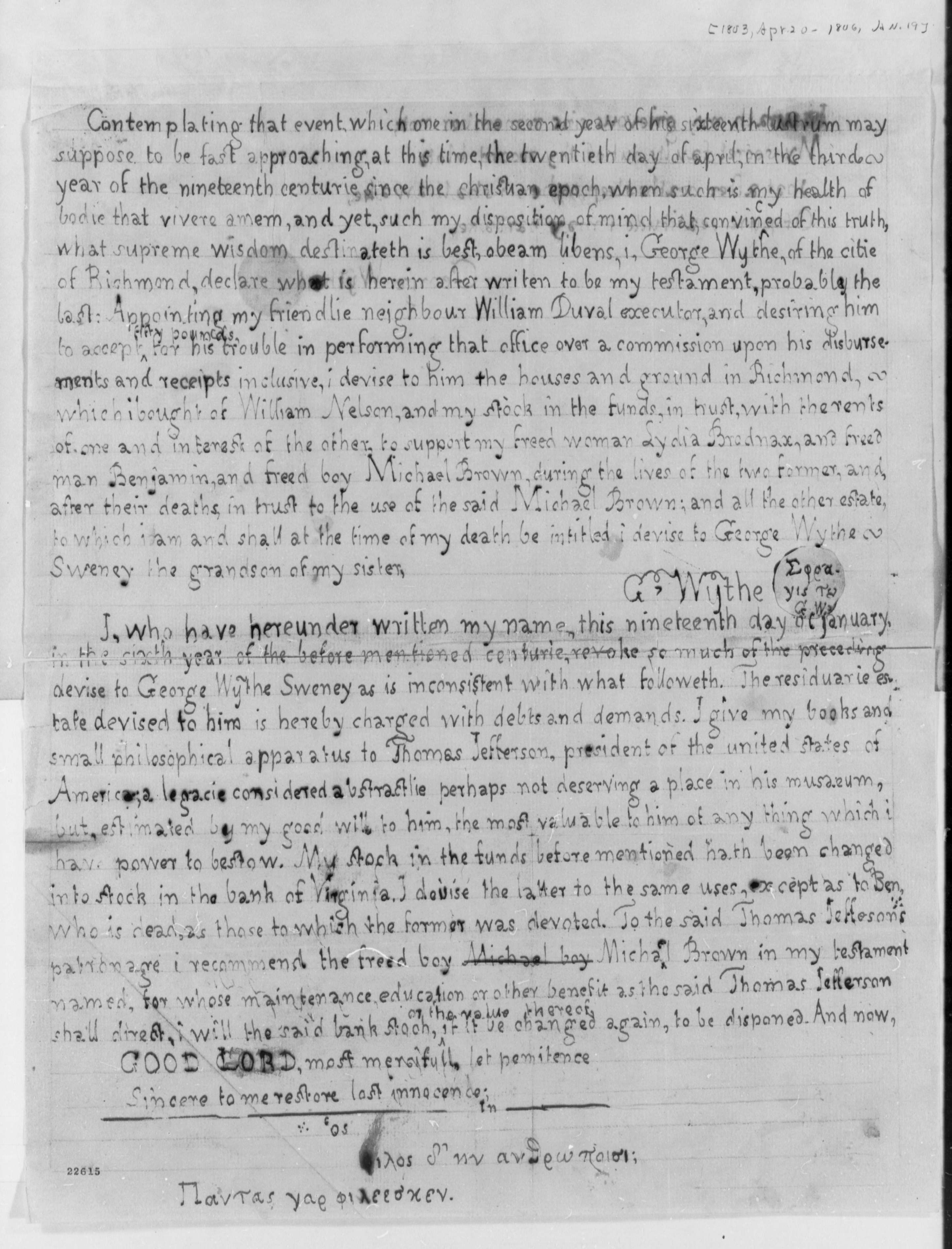
"George Wythe, June 11, 1806, Last Will and Testament with Codicil, p. 5." Image from the Library of Congress, The Thomas Jefferson Papers.
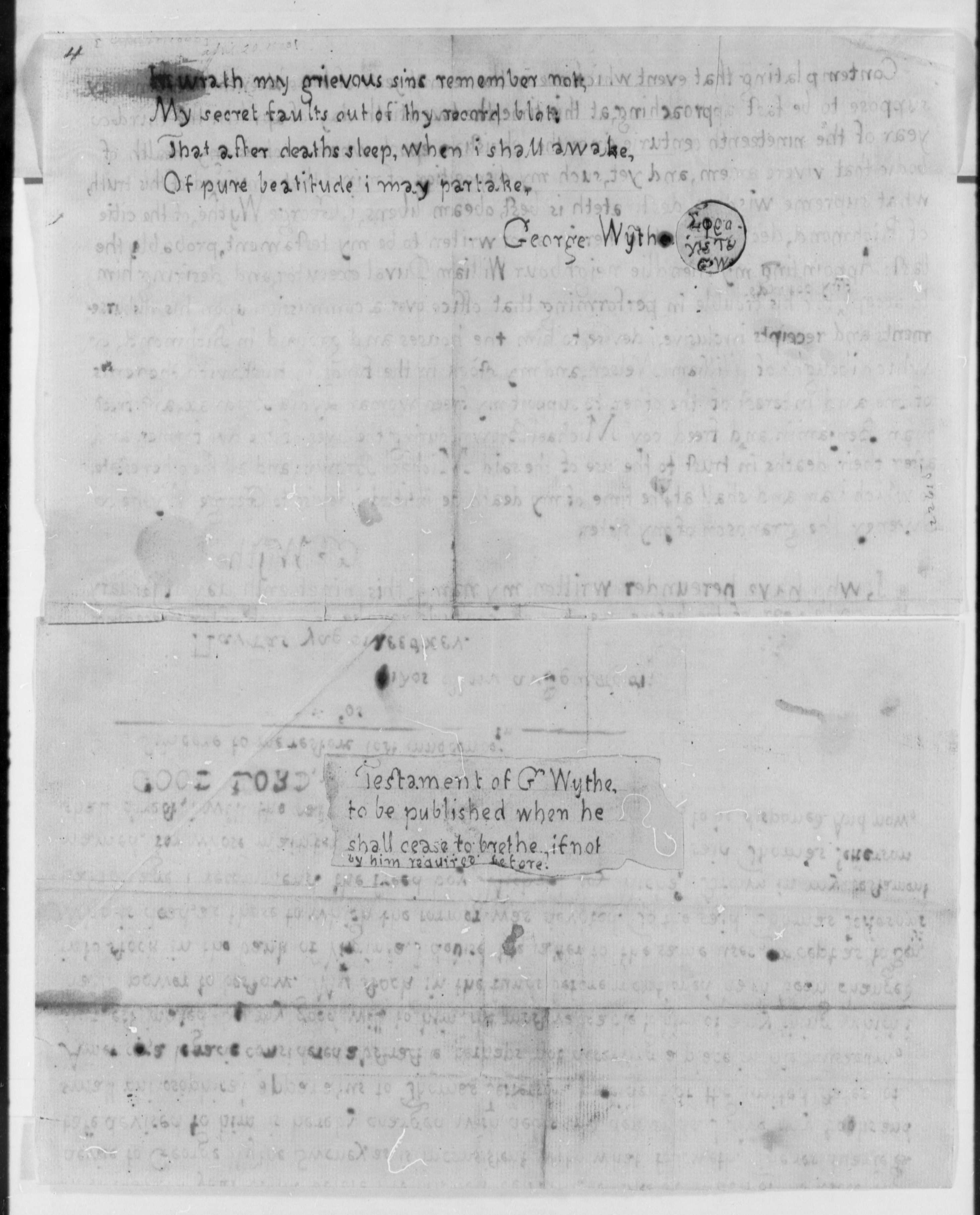
"George Wythe, June 11, 1806, Last Will and Testament with Codicil, p. 6." Image from the Library of Congress, The Thomas Jefferson Papers.
George Wythe died on June 8, 1806 as the result of a suspected poisoning. His last will and testament was read at a General Court in Richmond on June 11, witnessed by Edmund Randolph, William Price, Samuel Greenhow, and Samuel McCraw.
Wythe's will went through several changes before his death. The first version was written by Wythe in April, 1803, appointing William DuVal as his executor, granting the bulk of his estate to his grandnephew, George Wythe Sweeney, and making arrangements for the continued support of his household servants, Benjamin, Lydia Broadnax, and Michael Brown. A codicil to this will, added in January, 1806, gave his books and scientific instruments to Thomas Jefferson, and charged him with using the estate for the support of Brown. Wythe's servant Ben had died in the interim.
A copy of the will appears to have been made in 1806, which is not in Wythe's handwriting, but signed by William Allen, Clerk of the General Court. A second codicil was added to this will in February, 1806, making small changes and fatefully giving Brown's share of the estate to Sweeney in the event Michael dies "before his full age."
A third and finally codicil was hastily added on June 1, 1806 while Wythe lay on his deathbed, revoking Sweeney's share and dividing it among the other grandchildren of Wythe's sister.
The six-page manuscript of George Wythe's last will and testament is preserved in The Papers of Thomas Jefferson, at the Library of Congress, Washington, D.C.[1] The pagination of the collection is slightly out of order, with Wythe's original will of 1803 making up pages five and six, and the later 1806 copy comprising pages one through four. It has been chronologically ordered, here:
Contents
Document text, 20 April 1803 & codicil, 19 January 1806 (Wythe's copy)
[Page 1]
Contemplating that event, which one in the second year of his sixteenth lustrum may suppose to be fast approaching, at this time, the twentieth day of April in the third year of the nineteenth centurie since the christian epoch, when such is my health of bodie that vivere amem, and yet, such my disposition of mind that, convinced of this truth, what supreme wisdom destinateth is best, obeam libens,[2] i, George Wythe of the citie of Richmond, declare what is herein after written to be my testament, probably the last: Appointing my friendlie neighbour William Duval executor, and desiring him to accept fifty pounds for his trouble in performing that office over a commission upon his disbursements and receipts inclusive, i devise to him the houses and ground in Richmond which i bought of William Nelson, and my stock in the funds, in trust, with the rents of one and interest of the other to support my freed woman Lydia Brodnax, and freed man Benjamin, and freed boy Michael Brown, during the lives of the two former, and, after their deaths, in trust to the use of the said Michael Brown; and all the other estate to which i am and shall at the time of my death be intitled, i devise to George Wythe Sweney the grandson of my sister.
George Wythe [Seal]I, who have hereunder written my name, this nineteenth day of January, in the sixth year of the before mentioned centurie, revoke so much of the preceding devise to George Wythe Sweney as is inconsistent with what followeth. The residuarie estate devised to him is hereby charged with debts and demands. I give my books and small philosophical apparatus to Thomas Jefferson, president of the united states of America; a legacie, considered abstractlie perhaps not deserving a place in his musaeum, but, estimated by my good will to him, the most valuable to him of any thing which i have power to bestow. My stock in the funds before mentioned hath been changed into stock in the Bank of Virginia. I devise the latter to the same uses, except as to Ben, who is dead, as those to which the former was devoted. To the said Thomas Jefferson's patronage i recommend the freed boy
Michael boyMichael Brown in my testament named, for whose maintenance, education or benefit as the said Thomas Jefferson shall direct, i will the said bank stock, or the value thereof it it be changed again, to be disponed. And now,
GOOD LORD, most mercifull, let penitence
Sincere to me restore lost innocence;
ὃς
φιλος δ᾽ ην ανθρωποισι;
Παντας γαρ φιλεεσκεν.[3]
[Page 2]
In wrath my grievous sins remember not;
My secret faults out of thy record blot;
That after deaths sleep, when i shall awake,
Of pure beatitude i may partake,
George Wythe [Seal]
Testament of G' Wythe,
to be published when he
shall cease to brethe, if not
by him required before.
Document text, 1806 copy and codicils, 24 February & 1 June 1806
[Page 3]
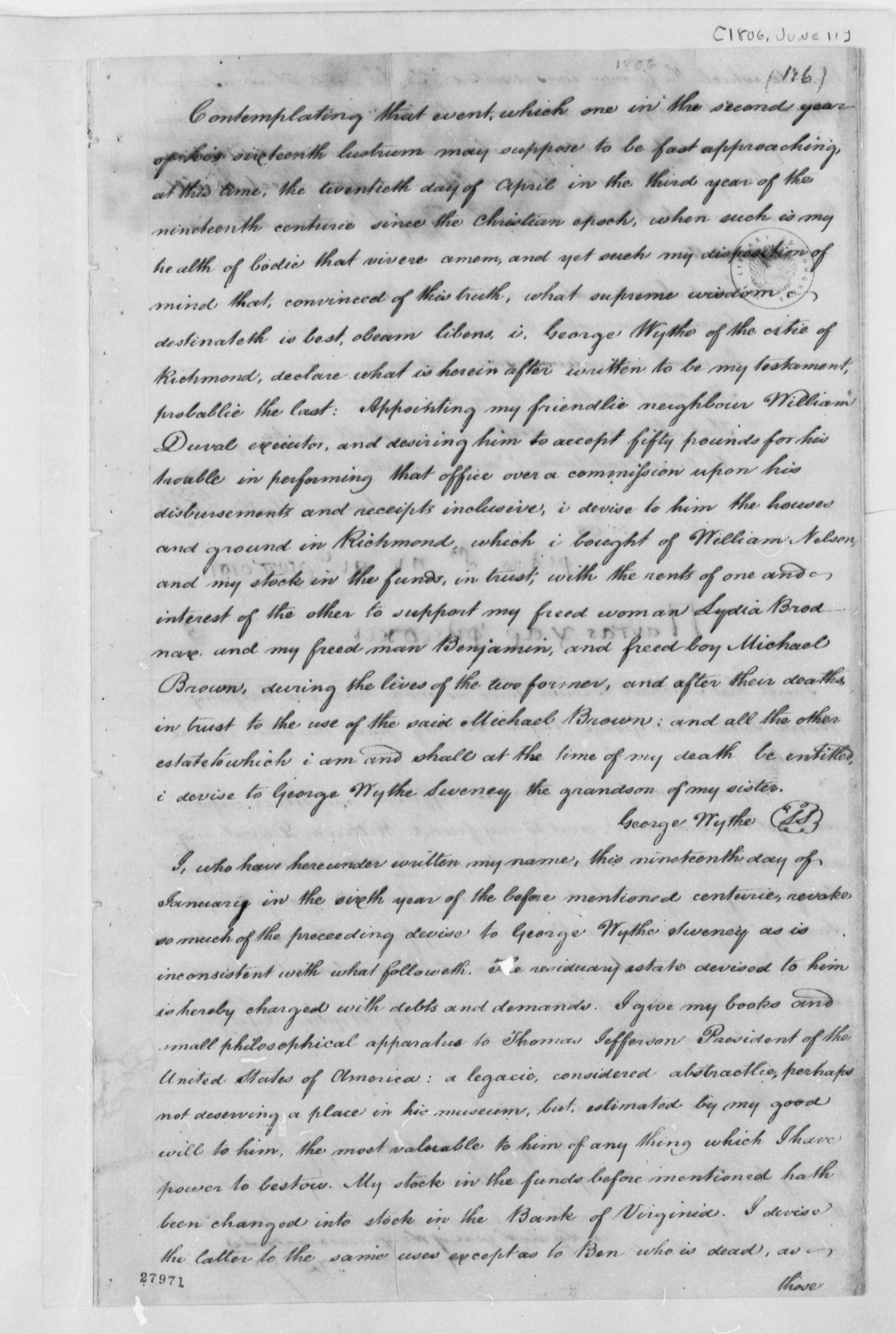
"George Wythe, June 11, 1806, Last Will and Testament with Codicil, p. 1." Image from the Library of Congress, The Thomas Jefferson Papers.
Contemplating that event, which one in the second year of this sixteenth lustrum may suppose to be fast approaching, at this time, the twentieth day of April in the third year of the nineteenth centurie since the Christian epoch, when such is my health of bodie that vivere amem, and yet such my disposition of mind that, convinced of this truth, what supreme wisdom destinateth is best, obeam libens, i, George Wythe of the citie of Richmond; declare what is herein after written to be my testament, probablie the last: Appointing my friendlie neighbor William Duval executor, and desiring him to accept fifty pounds for his trouble in performing that office over a commission upon his disbursements and receipts inclusive, i devise to him the houses and ground in Richmond, which i bought of William Nelson, and my stock in the funds, in trust; with the rents of one and interest of the other to support my freed woman Lydia Brodnax, and my freed man Benjamin, and freed boy Michael Brown, during the lives of the two former, and after their deaths, in trust to the use of the said Michael Brown; and all the other estate to which i am and shall at the time of my death be entitled, i devise to George Wythe Sweney the grandson of my sister.
George Wythe [Seal]I, who have hereunder written my name, this nineteenth day of January in the sixth year of the before mentioned centurie, revoke so much of the preceeding devise to George Wythe Sweney as is inconsistent with what followeth. The residuary estate devised to him is hereby charged with debts and demands. I give my books and small philosophical apparatus to Thomas Jefferson President of the United States of America: a legacie, considered abstractlie, perhaps not deserving a place in his museum, but, estimated by my good will to him, the most valuable to him of any thing which I have power to bestow. My stock in the funds before mentioned hath been changed into stock in the Bank of Virginia. I devise the latter to the same uses except as to Ben who is dead, as those
[Page 4]
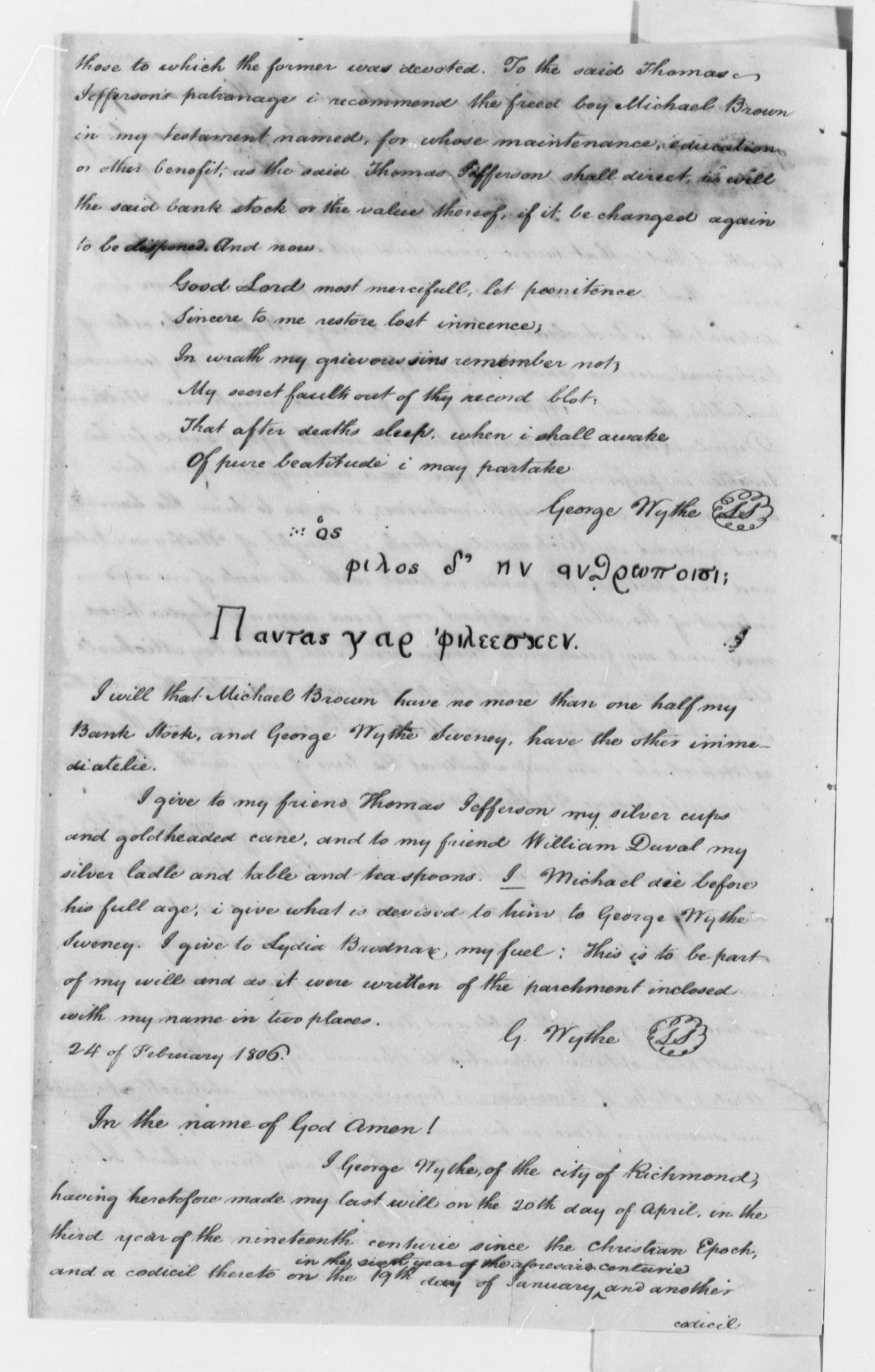
"George Wythe, June 11, 1806, Last Will and Testament with Codicil, p. 2." Image from the Library of Congress, The Thomas Jefferson Papers.
those to which the former was devoted. To the said Thomas Jefferson's patronage i recommend the freed boy Michael Brown in my testament named, for whose maintenance, education or other benefit, as the said Thomas Jefferson shall direct, i will the said bank stock or the value thereof, if it be changed again to be disposed. And now
Good Lord most mercifull, let penitence
Sincere to me restore lost innocence;
In wrath my grievous sins remember not;
My secret faults out of thy record blot;
That after deaths sleep, when i shall awake
Of pure beatitude i may partake
George Wythe [Seal]
ὃς
φιλος δ᾽ ην ανθρωποισι;
Παντας γαρ φιλεεσκεν.I will that Michael Brown have no more than one half my Bank Stock, and George Wythe Sweney, have the other immediatelie.
I give to my friend Thomas Jefferson my silver cups and gold headed cane, and to my friend William Duval my silver ladle and table and teaspoons. If Michael die before his full age: i give what is devised to him to George Wythe Sweney. I give to Lydia Brodnax my fuel: This is to be part of my will and as it were written of the parchment inclosed with my name in two places.
G. Wythe [Seal]
24 of February 1806.
In the name of God Amen!
I George Wythe, of the city of Richmond, having heretofore made my last will on the 20th day of April, in the third year of the nineteenth centurie since the Christian Epoch, and a codicil thereto on the 19th day of January in the sixth year of the aforesaid centurie and another codicil
[Page 5]
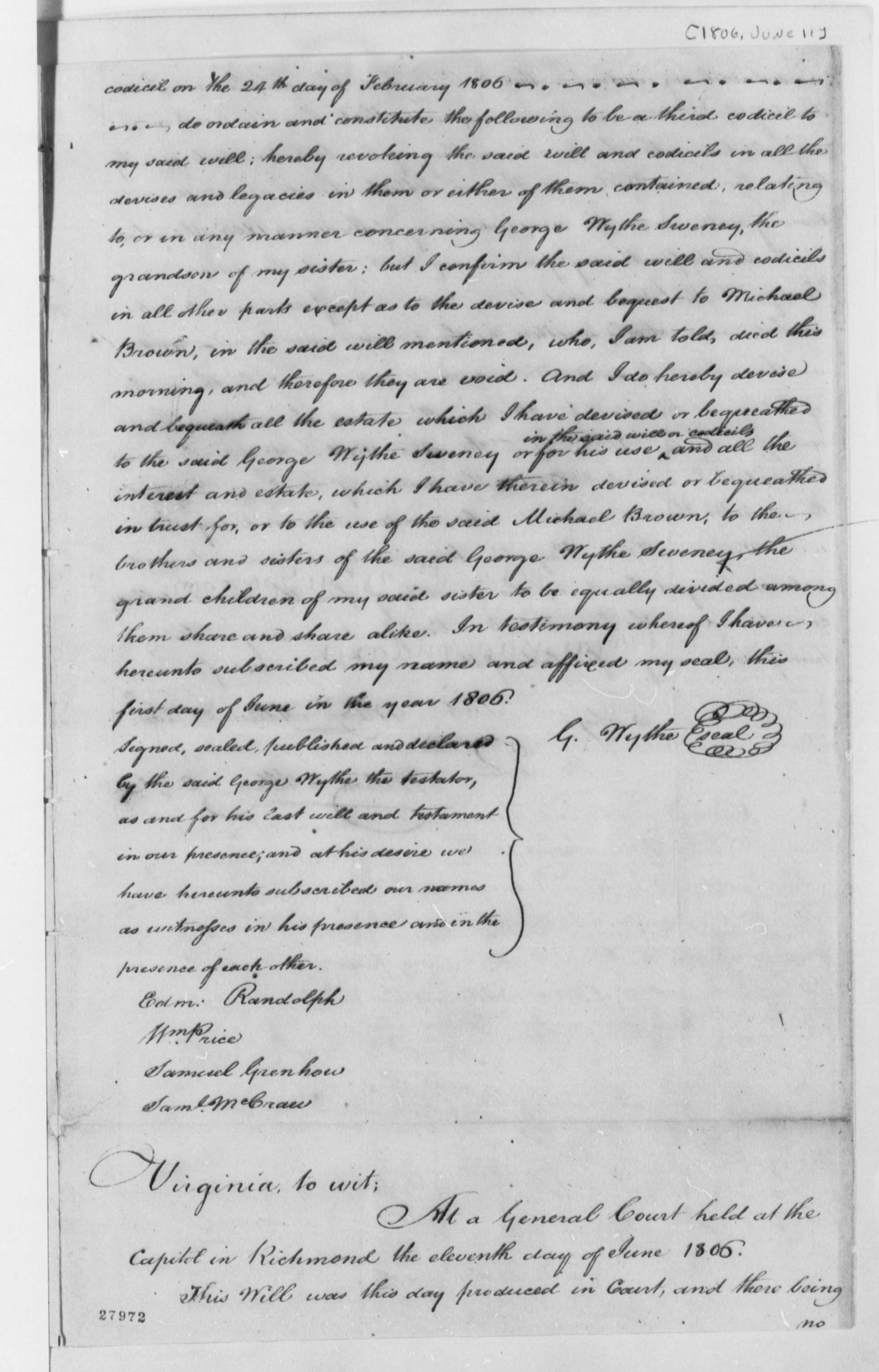
"George Wythe, June 11, 1806, Last Will and Testament with Codicil, p. 3." Image from the Library of Congress, The Thomas Jefferson Papers.
codicil on the 24th day of February 1806 –
do ordain and constitute the following to be a third codicil to my said will; hereby revoking the said will and codicils in all the devises and legacies in them or either of them contained, relating to, or in any manner concerning George Wythe Sweney, the grandson of my sister; but I confirm the said will and codicils in all other parts except as to the devise and bequest to Michael Brown, in the said will mentioned, who, I am told, died this morning, and therefore they are void. And I do hereby devise and bequeath all the estate which I have devised or bequeathed to the said George Wythe Sweney or for his use in the said will or codicils and all the interest and estate, which I have therein devised or bequeathed in trust for, or to the use of the said Michael Brown, to the brothers and sisters of the said George Wythe Sweney, the grand children of my said sister to be equally divided among them share and share alike. In testimony whereof I have hereunto subscribed my name and affixed my seal, this first day of June in the year of 1806.
- G. Wythe [seal]
Signed, sealed, published and declared
by the said George Wythe the testator,
as and for his last will and testament
in our presence; and at his desire we }
have hereunto subscribed our names
as witnesses in his presence and in the
presence of each other.
Edm: Randolph
Wm. Price
Samuel Greenhow
Saml. McCraw
Virginia, to wit;
At a General Court held at the Capitol in Richmond the eleventh day of June 1806.
This Will was this day produced in Court, and there being no
[Page 6]
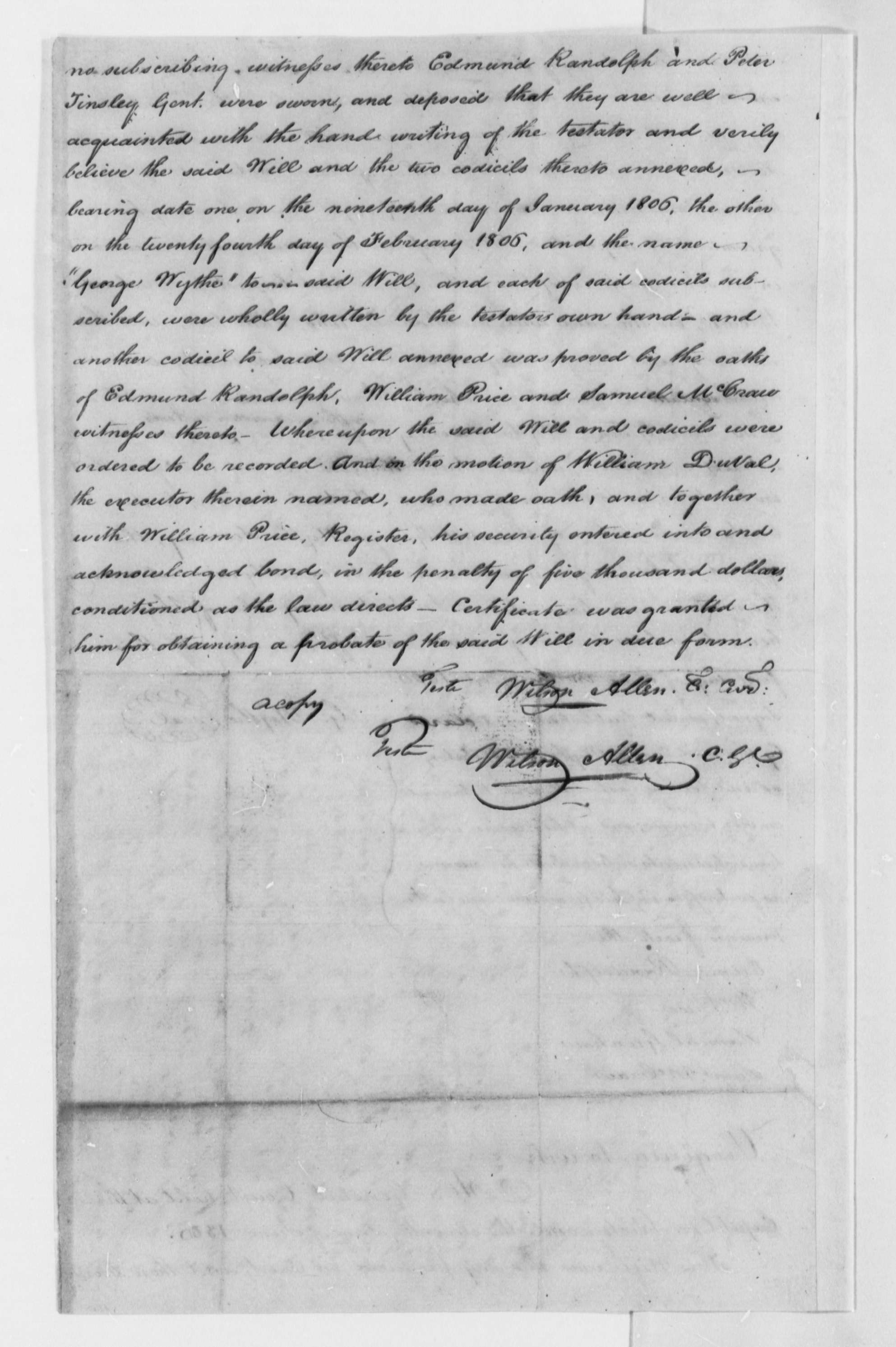
"George Wythe, June 11, 1806, Last Will and Testament with Codicil, p. 4." Image from the Library of Congress, The Thomas Jefferson Papers.
no subscribing witnesses thereto Edmund Randolph and Peter Tinsley Gent. were sworn, and deposed that they are well acquainted with the hand writing of the testator and verily believe the said Will and the two codicils thereto annexed, bearing date one on the nineteenth day of January 1806, the other on the twenty fourth day of February 1806, and the name "George Wythe" to said Will, and each of said codicils subscribed, were wholly written by the testators own hand – and another codicil to said Will annexed was proved by the oaths of Edmund Randolph, William Price and Samuel McCraw witnesses thereto – Whereupon the said Will and codicils were ordered to be recorded. And on the motion of William Duval, the executor therein named, who made oath, and together with William Price, Register, his security entered into and acknowledged bond, in the penalty of five thousand dollars, conditioned as the law directs – Certificate was granted him for obtaining a probate of the said Will in due form.
Teste Wilson Allen. C: Civc:
A copy
Teste Wilson Allen. C: GC.
See also
References
- ↑ The Thomas Jefferson Papers at the Library of Congress: Series 1: General Correspondence. 1651 to 1827, Library of Congress, Washington, D.C.
- ↑ Both Latin phrases - vivere amem (“I would like to live”) and obeam libens (“willing to die”) come from a poem by the first century BCE Roman poet Horace (Odes 3.9.24). The line comes from a humorous ode in which a woman, Lydia, states that she would like to live but is willing to die with her lover. Thus, Wythe takes a humorous, romantic turn of phrase from a Horatian Ode about love and applies it to his own mortality as he contemplates death, perhaps aiming to inject a bit levity into such a serious document.
- ↑ "Beloved for welcoming all guests." Homer, Iliad 1.14-15. Referring to Axylus, Teuthras' son, who was slain by Diomedes, and who was renowned for his hospitality.
External links
- George Wythe, June 11, 1806, Last Will and Testament with Codicil, Library of Congress.